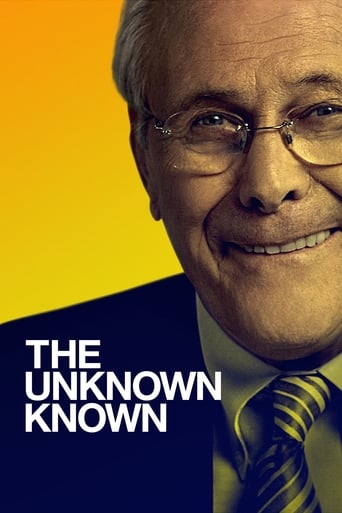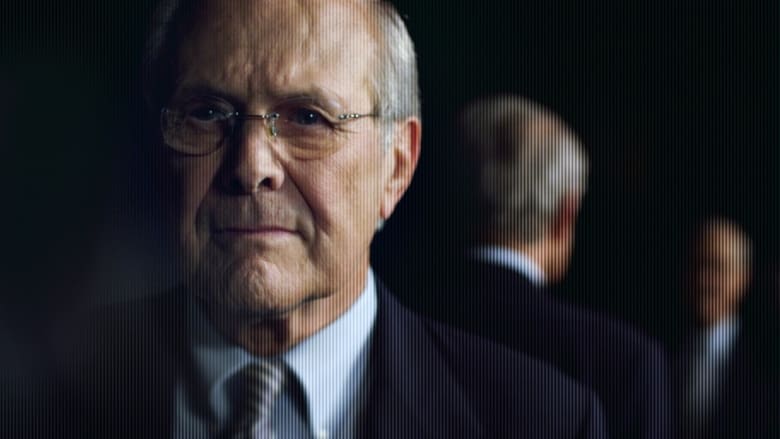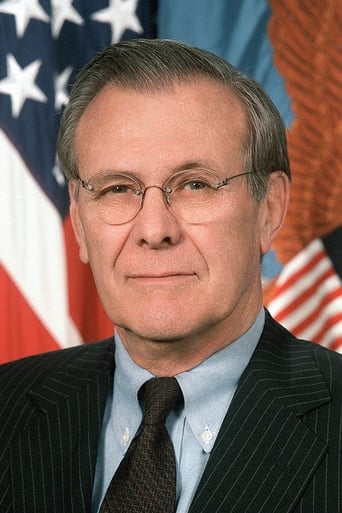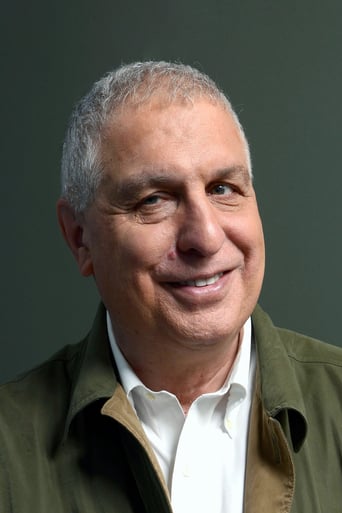The Unknown Known (2013)
Former United States Secretary of Defense, Donald Rumsfeld, discusses his career in Washington D.C. from his days as a congressman in the early 1960s to planning the invasion of Iraq in 2003.
Watch Trailer
Cast


Reviews
Simply A Masterpiece
I like movies that are aware of what they are selling... without [any] greater aspirations than to make people laugh and that's it.
Ok... Let's be honest. It cannot be the best movie but is quite enjoyable. The movie has the potential to develop a great plot for future movies
This is one of the best movies I’ve seen in a very long time. You have to go and see this on the big screen.
This Errol Morris documentary grew from 34 hours of interviews with former White House chief of staff, ambassador to NATO, head of the Office of Economic Opportunity, special Mid-East envoy, and twice Secretary of Defense Donald Rumsfeld. "Rumsfeld—in case you've forgotten his prominent public persona as a star of Bush-era press conferences—" Slate reviewer Dana Stevens reminds us, "tends to express himself in koan-like platitudes that hover in midair somewhere over the divide between timeless wisdom and obfuscatory bullshit." The film's title is based on one of his better-known riffs, the evasive and insufficiently serious response to a reporter's question in 2002 about the evidence for Iraq's link to terrorism and weapons of mass destruction. Rumsfeld responded that there are "known knowns" (stuff we know that we know), "known unknowns" (stuff we know that we don't know), and unknown unknowns (stuff we don't know that we don't know). The premise of The Unknown Known is there also was stuff Rumsfeld thought he knew, and didn't. Which sums up the whole stated justification for the Iraq war.It's hard to watch this movie without being distracted by one's own political views, as Rumsfeld, ever the cagey communicator, genially evades and stonewalls where he has to, especially regarding the use of torture. Yet he is capable of showing uncertainty—and would that he'd done so a dozen years ago. The interviews are interspersed with news clips, excerpts from news conferences, and on-the-ground footage of the time, so you do see some misremembering. His then-conviction about whether Iraq possessed weapons of mass destruction is quite a contrast to his "I guess time will tell" shrug regarding whether the Iraq war was a good idea or not.His evasions degrade political language, Forbes reviewer Tim Reuter suggests, and by constantly redefining difficult issues, Rumsfeld erases their meaning, rather than clarifies. In his New York Times review, A. O. Scott says Morris gives Rumsfeld "plenty of rope, but rather than hang himself, Mr. Rumsfeld tries to fashion a ladder and escape through the window." One problem he couldn't slip out of was Abu Ghraib, because shocked Americans had seen the terrible pictures. As head of the Department of Defense, he offered President Bush his resignation—twice. But Bush didn't accept it.Rumsfeld's many memos were called "snowflakes," and he blanketed the Department and his fellow Cabinet members with some 20,000 of them during his six years in the Bush Administration. In the film, he reads from a number of them, now declassified. Yet the viewer, like the recipients of that blizzard of memos sees only the Don Rumsfeld he wants us to see. Given his penchant for verbal legerdemain, he must have enjoyed the idea of snowflakes. Of snow. And of snow-jobs.UPDATE: In January 2015, I saw Morris's other documentary on a former Secretary of Defense, The Fog of War, created from interviews with Robert McNamara. While, like Rumsfeld, he sees history from his own particular vantage-point, unlike Rumsfeld, McNamara seemed to have learned some significant intellectual and emotional truths from the experience. The film in fact is organized around 11 "lessons." The difference in affect between the two men is remarkable. Although there were questions (mostly personal) McNamara declined to answer, he wasn't trying to obfuscate and he wasn't insufferably smug.
Many reviews of this film decry the lack of any new revelations of note. Many commentators argue that Donald Rumsfeld is evasive and too smart for Errol Morris.On the contrary I believe this is actually a better film, more revealing than "Fog of War". How, you may ask?Simply this, McNamara was emotional and outspoken. He captivated the audience. Rumsfeld was "cold and measured". This is just as thrilling. If you look very closely, there are subtle clues in his evasiveness, even if to illuminate his extreme arrogance as a veil for something hidden beneath.What that something is, we can only speculate on, but that is part of the film's appeal. We can learn more from the unknown knowns than what is clearly spelled out.
They say 'never forget 9/11'. Of course. I say never forget Rumsfeld, a man who at times seems fairly intelligent (cue up George Carlin's quick follow-up - "AH, he's FULL OF (bleep)!") and other times answers Errol Morris' questions in such a way where Morris just leaves the camera on him for a while afterward. There's almost that sensation looking at him like 'you stare at the abyss...' And yet, he did offer up his resignation at the time of the Abu-Gharib scandal, which seems for me to be a new revelation - and by the way, this is as much if not more-so a follow-up to Morris' Standard Operating Procedure as it is the Fog of War, the story of the soldiers there doing the torture and the pictures, this time it's the "Captain" - though how genuine this was, and of course how awfully it makes Bush look for not accepting it, is up for debate. There are a lot of shots of the ocean here, at one point an 'ocean of words' even. I feel like this is a superb metaphor for the film and this figure - what do we see when we look at it? Why does it look so calm? Morris never shows an ocean in a stormy mode; just the very calm surface, at one point split right down the middle. But there's so much going on underneath it. Plus aerial shots of the swamps as well.Morris' direction is impeccable as always, a fantastic, spot-on mix of news footage, many clips from Rumsfeld press conferences like when he first posited the 'known known etc' bit, as if he were giving out a portion of a script for a Jean-Luc Godard movie or some semantic babble (maybe poignant, but still babble). It almost has the effect, if only here and there, of the 'point-counter-point' method used on The Daily Show, showing him saying one thing here, another thing later. This isn't played for laughs, though, unless they are of the most highly uncomfortable, awkward, almost horror-movie variety.This is someone looking head-on, and Morris has always been the great detective of documentary directors, seeing how the facts pile up. But even here, what's remarkable, is that Morris puts his voice more than I've seen him do in past films. And at one point in reaction to Rumsfeld saying he never read documents pertaining to a particularly egregious act of abuse on detainees, he says in incredulity "REALLY?" This film is a burning reminder what a slippery character Rumsfeld was and is. He also had a knack for being efficient back in the Ford and Regan era as an envoy - of course they make light of his meeting with Sadaam in 1983, but more telling is how much Rumsfeld wanted to meet with and did spend hours with one of his 2nd in command and, it's almost the sense, he kind of identified with him - but really his time in Bush Jr's Sec post was where he made his name for better and worse...Actually, who really "knows" if it's for better, given with everything that he oversaw and approved of - or didn't approve but we can't really know what was approved or not approved (and then one gets into the "more you look the less you know" facet of things, which in this film and filmmaker carries as a an intense underlying ideology, but I digress sort of). It's fascinating to watch him and hear him talk, as much as it is almost creepy every time he gives his s***-eating grin. Not just the smile but the eyes as well.What is he thinking when he says these things, responding to Morris as he did in his press conferences with questions that he answers himself? Morris uses a visual approach of dictionary terms at many points, as well as Rumsfeld's countless memos, and I got a sense of a man who was very much aware of what he was doing. And, at the end of it all, when Morris asks point blank "Why are you doing this, talking to me?" with "That's a vicious question... I guess you'll never know" I have to wonder if he does, or really doesn't.The Unknown Known. I never have quite forgotten Rumsfeld over the years since he left his office in 2006, but this film brought back a flesh flood of memories along with that face and old but very much KNOWING eyes. At the end of the day, he is not a stupid man, or at least believes he isn't, has his own rigorous set of logic and follows it. That it also led it into two wars, one still going on, and so so so so many lives lost.... damn.
I want to first say that I thought Errol Morris' previous film - the fog of war - was excellent. I am a fan of his style and also of his ambition to take on such large characters of history. However, I think he failed this last attempt quite dramatically. The movie was boring, redundant, un-insightful, and - worst of all - wasted an hour and a half of my life. In my opinion there are only a few reason why this turned out to be a failure: 1) Don is actually a pretty honest guy (but boring) and remembers quite a lot which takes Errol by surprise 2) Errol didn't pull the trigger on (i.e. address on camera) some big inconsistencies in his memos and his interviews 3) Errol goes into this thinking he has Don with the millions of memos and hours of interview time but then gets completely dismantled by Don in his questioning thus resulting in wasted time/filmWhile I cannot tell you which is true, the result is a failure by the director to really provide the audience any sort of substance for his money/time. I wish Errol would have either asked Don about more or not marketed the film as something a history buff may like. Lastly some of my many questions from the movie: Honestly, who really cares about how the words unknown and known are put together in a sentence?? Out of all the interesting stuff this man knows why did you consistently highlight (i.e. use film time for) the fact that hes a word freak and wrote millions of memos? So this guy is pedantic...we get it but who cares??? Why did you show hundreds of newspaper headlines but really not get the bottom of any of them? How did you not find one slip up in those millions of memos? Why did you choose Don if you knew how smart/clever/boring he was?Do yourself a favor and go watch fog of war and don't waste your time on this like the director did.







